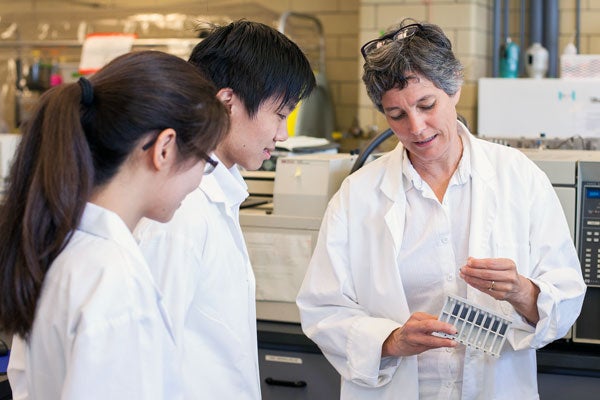
New $5 million NSERC network uses enzymes for greener manufacturing
Published: December 2, 2014
Instead of using fossil fuels to make plastics and industrial chemicals, what if we could harness eco-friendly enzymes – nature’s smallest helpers – to do the work?
On November 28, the Natural Sciences and Engineering Research Council (NSERC) announced a five-year, $5-million grant to create the Industrial Biocatalysis Network (IBN). Based at the University of Toronto and led by U of T Professor Elizabeth Edwards of chemical engineering, the network will explore new methods of using enzymes to produce environmentally-friendly chemicals, plastics and other products.
Enzymes are special biological molecules that exist in every living organism. They act as catalysts that make nearly all of nature’s chemical transformations happen. In the most basic sense, they turn one substance into another. For example, they change cellulose into nutrient-rich glucose in a decomposing log, or break down fat and starch in your digestive system.
Through the new IBN, researchers from the University of Toronto, University of British Columbia, Concordia University and several industry partners will work together to find enzymes that can convert renewable resources – such as agricultural or forestry waste – into new materials. These processes could substantially reduce energy consumption and carbon emissions compared to fossil fuels.
“Recent genomic research has revealed tens of thousands of new enzymes, many of which may have capabilities relevant to industrial manufacturing,” said Edwards. “The IBN brings together a unique and world-leading combination of expertise in bioinformatics, bioengineering and fungal, yeast and bacterial enzymology to discover greener methods for manufacturing.”
Edwards’ team includes five professors from U of T Engineering’s BioZone, a research centre dedicated to bioengineering and applied bioscience, as well as graduate students and postdoctoral fellows. They will be strategically mining the genomics data of enzymes and testing them for specific functions.
“Together, we’ll find the needles in the haystack,” she said.
Edwards is a pioneer in bioremediation, a technique in which living organisms are used to clean up environmental contamination. In a recent project with Geosyntec Consultants Inc., she developed microbial cultures that can degrade chlorinated solvents and other toxic chemicals in groundwater sites that have been contaminated. This work was recognized with the NSERC Synergy Award in 2009, and it’s being used to clean up over 400 polluted sites worldwide.
At BioZone, Edwards and her colleagues recently completed a major four-year research effort in environmental genomics funded by Genome Canada that aimed to catalog enzymes from extreme environments. The project yielded large numbers of potentially useful enzymes, some of which will be put to the test in the new IBN.
“Under Professor Elizabeth Edwards’ remarkable leadership, the Industrial Biocatalysis Network will accelerate the manufacturing innovations we need for a more sustainable future,” said Cristina Amon, dean of U of T’s Faculty of Applied Science & Engineering. “On behalf of the Faculty, I offer my deepest thanks to Elizabeth for leading this transformative initiative and to NSERC for enabling this important collaborative research network.”
The Network was created through NSERC’s highly competitive Strategic Network Grants program, which supports large-scale, multidisciplinary research projects that require collaboration between academic researchers, organizations and companies. The program encourages research and training in targeted areas that show promise of enhancing Canada’s economy, society and environment within the next 10 years.
The IBN has been designed to support Canada’s growth in the emerging bio-based chemical and materials sector. Industrial partners include several manufacturing, chemical and petroleum companies, such as CanSyn Chem Corp., DuPont Canada Inc., Elanco Animal Health/Division of Eli Lilly, Lallemand Inc., Monaghan Biosciences Ltd. and Suncor Energy Inc.
“Strategic Network Grants foster the kind of collaboration that allows students, established researchers, businesses and others to work hand-in-hand on the discoveries and innovations that will have impact in a reduced time frame,” said NSERC president Dr. B. Mario Pinto. “The transformative breakthroughs that result from this kind of collaboration help to tackle complex research questions and accelerate solutions to some of society’s toughest challenges.”
U of T Engineering Professor Alberto Leon-Garcia was also awarded a Strategic Networks Grant in 2011 for the NSERC Strategic Network in Smart Applications on Virtual Infrastructure, intended to foster innovative application platforms, create new job opportunities in the computing and communications sectors and allow Canadians to share digital information more quickly and easily.



